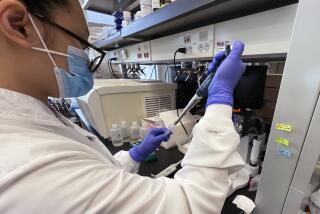U.S. May Urge AIDS Tests for Medical Staffs
- Share via
WASHINGTON — Federal health officials are leaning strongly toward recommending that hospitals and other facilities routinely give AIDS tests to surgeons and other health care professionals who perform invasive procedures, then bar those who test positive from such work.
Dr. William Roper, director of the federal Centers for Disease Control, said Wednesday he had not made a final decision.
“We’re thinking carefully about the process, and we are hearing from a lot of people--individuals and groups who have strongly held views on the matter,” he said. “I’m anxious for us to have as thoughtful a process as we can.”
However, knowledgeable sources said that while no final decision has been made, Roper and his superiors--including Health and Human Services Secretary Louis W. Sullivan and Assistant Secretary for Health James O. Mason--are inclined toward favoring the recommendations for new restrictions.
“Dr. Roper has not made up his mind but from the very beginning his philosophy has been that a physician should ‘first, do no harm,’ ” said one source, who spoke on the condition of anonymity.
“He feels that a physician should not infect a patient. If you accept the fact that transmission can occur, he finds it hard to understand why an infected physician should be allowed to perform invasive procedures,” the source added.
The CDC, according to sources, defines an invasive procedure as one “in which a health care worker’s hand is inside a body cavity where there is also a sharp instrument present.” This would include most surgical operations, as well as many dental procedures.
The discussion has become the most controversial AIDS policy debate on the federal level for the last several years, and has been the focus of intense discussion since the CDC announced last summer that a dentist suffering from AIDS may have infected one of his patients during a tooth extraction. The case is still under investigation.
While the CDC’s recommendations are not binding, they traditionally wield influence and are often considered the final word.
If public health officials propose the new restrictions, they are likely to reopen the national debate over the testing of other groups, particularly surgical patients. The action may also raise questions of employment discrimination and violation of confidentiality--two issues that have become extremely sensitive in the context of the AIDS epidemic.
While the overall risk of transmission between health professionals and patients is considered extremely low, medical experts believe that health care workers are in greater danger of infection from patients than vice versa.
At one time, the CDC considered recommending that all patients admitted to hospitals be tested, but later rejected the idea. Instead, the agency has urged health care workers to regard the blood of all patients as potentially infectious and to practice universal precautions, including wearing gloves, gowns, masks, caps and protective eye wear.
Sources said that Roper is also considering a second, less restrictive, option.
“That one is for CDC to say that the discussions have all pointed out that previous guidelines are inadequate and that each institution should at least debate the issue of whether they should engage in exclusion or mandatory testing,” one source said.
Roper stressed that once the proposed guidelines are released, they will be open to a period of public comment and could undergo further changes.
The CDC’s current guidelines on health care workers infected with the human immunodeficiency virus say only that decisions about whether they can safely perform invasive procedures “must be determined on an individual basis.”
The CDC has been under tremendous pressure from a range of medical and public health groups who oppose restricting the practice of health care workers. These include the American Public Health Assn., the American Academy of Pediatrics, the American College of Preventive Medicine, the American Nurses Assn., the Assn. of State and Territorial Health Officials, the U.S. Conference of Local Health Officers and others.
They argue that the risk of transmission is remote. Further, they say that restrictions would not necessarily identify or prevent infected workers from performing invasive procedures and would have a “devastating social and economic” impact on the health care delivery system.
The issue of HIV-infected health care workers and invasive procedures erupted last summer after the CDC released a preliminary report on a suspected case of dentist-to-patient transmission.
Dr. David Acer, a Florida dentist who has since died of AIDS, appeared to have inadvertently infected a patient, Kimberly Bergalis, now 22. Strains of the virus from both Acer and Bergalis were extremely similar, the CDC said, indicating that Acer was the source of the infection.
The CDC initially theorized that Acer had somehow injured himself while operating on Bergalis and that his blood had mixed with hers during the procedure.
Since the original report, two--and possibly three--other infected patients of Acer’s have been discovered, although it is not yet clear whether they were infected in Acer’s office.
The investigation is now focusing on the disinfection practices of the dentist, and whether contaminated equipment may have transmitted the virus. The CDC officials said that they are awaiting the results of lab studies on viral samples taken from the additional patients to see if they are similar to Acer’s.
In a separate development earlier this week, Johns Hopkins Hospital in Baltimore confirmed that Dr. Rudolph Almaraz, a well-known breast surgeon who worked there for several years, had died of AIDS. The hospital began mailing letters to 1,800 former patients offering free counseling and testing for the virus.
More to Read
Sign up for Essential California
The most important California stories and recommendations in your inbox every morning.
You may occasionally receive promotional content from the Los Angeles Times.













